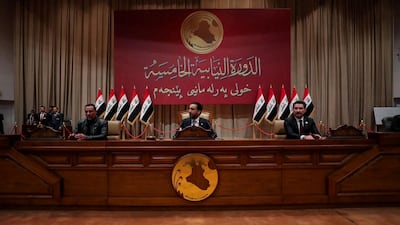Iraq's parliament has officially terminated the membership of its former speaker Mohammed Al Halbousi, following a ruling by the country’s top court.
Earlier this year, Sunni legislator Laith Al Dulaimi accused Mr Al Halbousi of forging his signature and a date on a resignation letter.
After a months-long legal battle, the Federal Supreme Court last week ruled to oust Mr Al Halbousi and remove Mr Al Dulaimi as an MP.
The termination of Mr Al Halbousi's membership was announced on Tuesday when the parliament published the decision, signed by Deputy Speaker Mohsen Al Mandalawi, referring to the court ruling.
On Monday, the parliament sent a letter to the Independent High Elections Commission to name his replacement as a legislator.
According to the law, the candidate with the most votes who lost to Mr Al Halbousi in the October 2021 elections will take his constituency seat.
After the 2003 US-led invasion that toppled Saddam Hussein, the US introduced a new political system in Iraq based on national elections every four years to select a parliament, from which the government would be formed.
But the results are not the main factor in the formation of governments, and this has been a source of controversy since Iraq's first free elections in 2005.
Division of power
Under an unofficial agreement between political parties, Iraq’s presidency – a largely ceremonial role – is held by a Kurd, while the prime minister's post is reserved for a Shiite and that of speaker of parliament for a Sunni.
Other government posts are divided among the country’s political parties based on their religious and ethnic backgrounds.
On Monday parliament announced that an exceptional session to vote on a new speaker of parliament would be held on Wednesday.
The main Sunni political parties are yet to agree on a nominee. Mr Al Halbousi is insisting the candidate must be from his Taqadum Party, while some of his rivals are eyeing the post.
After last week's ruling, Mr Al Halbousi challenged his dismissal as unconstitutional, saying it was not within the court's jurisdiction to look into the validity of membership of parliament.
The Federal Supreme Court, he said, determines the constitutionality of laws and regulations and settles disputes between the federal government, regions and provinces.
Parliamentary membership and termination, he said, are governed by specific constitutional articles, laws and procedures inside the parliament, which are beyond the court's remit.
“The court has no right to look into the legitimacy of the membership of the lawmaker,” he said.
The Taqadum Party later said its ministers of planning, industry and culture would be resigning, as would MPs on parliamentary committees, in protest at Mr Al Halbousi's dismissal.
The MPs will not attend parliamentary sessions and Taqadum will boycott political meetings with other parties, it said.
Iraqi Prime Minister Mohammed Shia Al Sudani rejected the resignation of the three Sunni ministers, according to a government statement on Monday.


